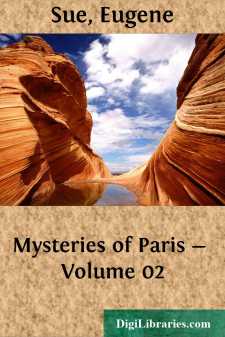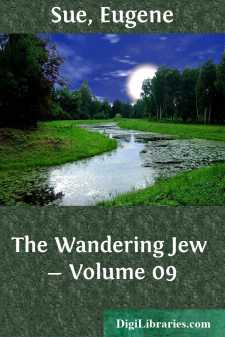Categories
- Antiques & Collectibles 13
- Architecture 36
- Art 48
- Bibles 22
- Biography & Autobiography 813
- Body, Mind & Spirit 142
- Business & Economics 28
- Children's Books 17
- Children's Fiction 14
- Computers 4
- Cooking 94
- Crafts & Hobbies 4
- Drama 346
- Education 46
- Family & Relationships 57
- Fiction 11829
- Games 19
- Gardening 17
- Health & Fitness 34
- History 1377
- House & Home 1
- Humor 147
- Juvenile Fiction 1873
- Juvenile Nonfiction 202
- Language Arts & Disciplines 88
- Law 16
- Literary Collections 686
- Literary Criticism 179
- Mathematics 13
- Medical 41
- Music 40
- Nature 179
- Non-Classifiable 1768
- Performing Arts 7
- Periodicals 1453
- Philosophy 64
- Photography 2
- Poetry 896
- Political Science 203
- Psychology 42
- Reference 154
- Religion 513
- Science 126
- Self-Help 84
- Social Science 81
- Sports & Recreation 34
- Study Aids 3
- Technology & Engineering 59
- Transportation 23
- Travel 463
- True Crime 29
Eugene Sue
Eugene Sue was a 19th-century French novelist best known for his works of social criticism and serialized novels, particularly "The Mysteries of Paris" (1842-1843) and "The Wandering Jew" (1844-1845). His writings, characterized by their vivid portrayals of the struggles of the urban poor, were immensely popular and influential in shaping public opinion and social reform movements in France. Sue's novels often combined melodrama with detailed depictions of contemporary life, earning him a lasting place in the annals of French literature.
Author's Books:
Sort by:
by:
Eugene Sue
The Wandering Jew. First Part.—The Transgression. Prologue. The Land's End of Two Worlds. The Arctic Ocean encircles with a belt of eternal ice the desert confines of Siberia and North America—the uttermost limits of the Old and New worlds, separated by the narrow, channel, known as Behring's Straits. The last days of September have arrived. The equinox has brought with it darkness and...
more...
by:
Eugene Sue
THE WANDERING JEW'S SENTENCE. The site is wild and rugged. It is a lofty eminence covered with huge boulders of sandstone, between which rise birch trees and oaks, their foliage already yellowed by autumn. These tall trees stand out from the background of red light, which the sun has left in the west, resembling the reflection of a great fire. From this eminence the eye looks down into a deep...
more...
by:
Eugene Sue
THE RUINS OF THE ABBEY OF ST. JOHN THE BAPTIST. The sun is fast sinking. In the depths of an immense piny wood, in the midst of profound solitude, rise the ruins of an abbey, once sacred to St. John the Baptist. Ivy, moss, and creeping plants, almost entirely conceal the stones, now black with age. Some broken arches, some walls pierced with ovals, still remain standing, visible on the dark background...
more...
by:
Eugene Sue
CHAPTER I. THE WANDERING JEW'S CHASTISEMENT. 'Tis night—the moon is brightly shining, the brilliant stars are sparkling in a sky of melancholy calmness, the shrill whistlings of a northerly wind—cold, bleak, and evil-bearing—are increasing: winding about, and bursting into violent blasts, with their harsh and hissing gusts, they are sweeping the heights of Montmartre. A man is standing...
more...
by:
Eugene Sue
About two hours before the event last related took place at St. Mary's Convent, Rodin and Abbe d'Aigrigny met in the room where we have already seen them, in the Rue du Milieu-des-Ursins. Since the Revolution of July, Father d'Aigrigny had thought proper to remove for the moment to this temporary habitation all the secret archives and correspondence of his Order—a prudent measure,...
more...
by:
Eugene Sue
THE EXECUTION. The surprised lapidary rose and opened the door. Two men entered the garret. One of them was tall and thin, with a face mean and pimpled, surrounded by thick, grayish whiskers; he held in his hand a stout loaded cane, and wore a shapeless hat and a large green greatcoat, covered with mud, and buttoned close up to the neck; the black velvet collar, much worn, exposed to view his long,...
more...
by:
Eugene Sue
THE GUEST. He who writes this account is called Joel, the brenn of the tribe of Karnak; he is the son of Marik, who was the son of Kirio, the son of Tiras, the son of Gomer, the son of Vorr, the son of Glenan, the son of Erer, the son of Roderik chosen chief of the Gallic army that, now two hundred and seventy-seven years ago, levied tribute upon Rome. Gallic word for chief. Joel (why should I not say...
more...
by:
Eugene Sue
THE EAST INDIAN IN PARIS. Since three days, Mdlle. de Cardoville had left Dr. Baleinier's. The following scene took place in a little dwelling in the Rue Blanche, to which Djalma had been conducted in the name of his unknown protector. Fancy to yourself a pretty, circular apartment, hung with Indian drapery, with purple figures on a gray ground, just relieved by a few threads of gold. The ceiling,...
more...
by:
Eugene Sue
THE CONSTANT WANDERER. It is night. The moon shines and the stars glimmer in the midst of a serene but cheerless sky; the sharp whistlings of the north wind, that fatal, dry, and icy breeze, ever and anon burst forth in violent gusts. With its harsh and cutting breath, it sweeps Montmartre's Heights. On the highest point of the hills, a man is standing. His long shadow is cast upon the stony,...
more...
by:
Eugene Sue
A GOOD GENIUS. The first of the two, whose arrival had interrupted the answer of the notary, was Faringhea. At sight of this man's forbidding countenance, Samuel approached, and said to him: "Who are you, sir?" After casting a piercing glance at Rodin, who started but soon recovered his habitual coolness, Faringhea replied to Samuel: "Prince Djalma arrived lately from India, in order...
more...











